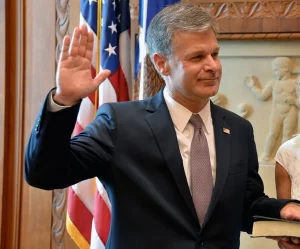Wray's decision to step down raises crucial questions about the future leadership of the FBI, specifically regarding the nomination of a potential successor amid political tensions.
FBI Director Christopher Wray Resigns Amid Political Pressure

FBI Director Christopher Wray Resigns Amid Political Pressure
FBI Director Christopher Wray's resignation marks a significant transition for the agency just seven years into his term, following pressure from President Trump.
Christopher Wray announced his resignation as FBI Director on Wednesday, citing the approaching inauguration of President-elect Donald Trump as a significant factor in his decision to leave the agency early, just three years before the completion of his ten-year term. This unexpected exit, fueled by pressure from Trump, has created a ripple effect within the political landscape.
In his resignation statement, Wray expressed a heartfelt commitment to the Bureau's mission, acknowledging the difficulties of stepping down during such a turbulent time. “This is not easy for me,” he explained, highlighting his dedication to the FBI and its personnel amid an increasingly contentious political climate. His desire to keep the agency's focus amidst such pressures was clear. "My focus is, and always has been, on us and doing what’s right for the FBI," Wray stated.
The nomination of Kash Patel by President Trump to take over the role of FBI Director played a crucial role in Wray’s decision. Reports indicate that Wray faced a choice: resign voluntarily or risk being terminated. This development raises important debates among political analysts and legal experts regarding the implications of a leadership shift at such a critical juncture for the Bureau.
Wray's term as FBI Director was fraught with challenges, including various investigations that received backlash from both ends of the political spectrum. Throughout his time in office, he endeavored to insulate the Bureau from political entanglements, maintaining its focus on protecting the American populace. His departure underscores the external pressures he encountered while striving to uphold the integrity of the agency during a time of political strife.
Patel's potential leadership may signal a significant shift in the FBI's operational priorities, considering his history as a senior official supporting Trump's agenda. The upcoming transition in leadership is poised to alter the Bureau's trajectory as it faces pressing political dynamics.
As Wray exits his role, the relationship between law enforcement and politics remains a delicate balance. His resignation marks an important juncture for the agency, ultimately prompting discussions about the foundational principles that have shaped the FBI throughout its history. With the Bureau on the brink of a new chapter, attention will be on how it navigates the challenges that lie ahead.
In his resignation statement, Wray expressed a heartfelt commitment to the Bureau's mission, acknowledging the difficulties of stepping down during such a turbulent time. “This is not easy for me,” he explained, highlighting his dedication to the FBI and its personnel amid an increasingly contentious political climate. His desire to keep the agency's focus amidst such pressures was clear. "My focus is, and always has been, on us and doing what’s right for the FBI," Wray stated.
The nomination of Kash Patel by President Trump to take over the role of FBI Director played a crucial role in Wray’s decision. Reports indicate that Wray faced a choice: resign voluntarily or risk being terminated. This development raises important debates among political analysts and legal experts regarding the implications of a leadership shift at such a critical juncture for the Bureau.
Wray's term as FBI Director was fraught with challenges, including various investigations that received backlash from both ends of the political spectrum. Throughout his time in office, he endeavored to insulate the Bureau from political entanglements, maintaining its focus on protecting the American populace. His departure underscores the external pressures he encountered while striving to uphold the integrity of the agency during a time of political strife.
Patel's potential leadership may signal a significant shift in the FBI's operational priorities, considering his history as a senior official supporting Trump's agenda. The upcoming transition in leadership is poised to alter the Bureau's trajectory as it faces pressing political dynamics.
As Wray exits his role, the relationship between law enforcement and politics remains a delicate balance. His resignation marks an important juncture for the agency, ultimately prompting discussions about the foundational principles that have shaped the FBI throughout its history. With the Bureau on the brink of a new chapter, attention will be on how it navigates the challenges that lie ahead.





















